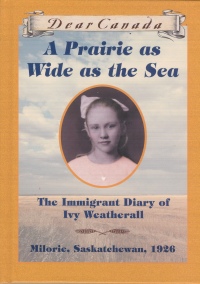| ________________
CM . . .
. Volume XVIII Number 8. . . .October 21, 2011
excerpt:
Ivy Weatherall’s diary depicts prairie life through the eyes of an 11-year-old girl who is moving from London, England, to Milorie, Saskatchewan, in 1926. Her sadness at leaving her cat behind is soon eclipsed by a myriad of new experiences from exploring their ship, the Ausonia, to seeing a bear from the train window as they cross Ontario. Ivy’s daily diary entries are written in an upbeat and matter-of-fact tone. Events as they are relayed to the reader introduce her loving parents, a 14-year-old brother, William, and the twins Harry and Gladys who are six. As the family travels by train from Quebec City to Saskatchewan, Ivy compares some of her experiences to those recorded in Lost in the Backwoods (Catharine Parr Traill, 1882), a “Canadian book” given to her by her Auntie Lou. This leaves her feeling quite fortunate as her hardships are less severe. Her dad reads his Canada West booklet which portrays an optimistic view of what they should expect in this new country where people get rich and are no longer isolated because of the radio. Their adventure meets a roadblock when they reach Uncle Alf’s house and find that it is a soddie, that he rents his farm (it is not large enough to call it a ranch) and that he owes money to every merchant in town. This is a shock for Ivy and her family who have been led to believe, by Uncle Alf’s letters, and government publications, that all is well and Canada is a land of great opportunity. Mr. Burgess, the general store owner, offers William a job as a clerk in his store on the condition that half his wages go to paying off his uncle’s debts. This forces William to give up his dream of “riding the range.” Mr. Burgess also finds them a house on a deserted farm, but no one can offer her dad steady work. Sarah Ellis has crafted a “Dear Canada” series novel that has an interesting plot, uses historically accurate vocabulary and compares and contrasts these terms with those used in Britain. Some examples are conkers, stroppy, toffee-nose and the loo. Readers learn many interesting details of life at that time: the Eaton’s catalogue is used as “loo paper,” chopping off a chickens head with an axe is not the best way to kill it, and you get one cent for each gopher tail. Ellis relates many hardships faced by settlers in the 1920’s, but she keeps her main characters hopeful and resourceful. The use of different words contributes to Ivy’s own problem when her mother asks her to go to the store to get some “cotton.” She is shy and tongue-tied when Mrs. Burgess takes down a roll of cotton fabric, asks her how much, so she guesses “Five yards,” and is concerned, but enlightened when Mrs. Burgess asks her if she would also like some thread. She leaves the store with both “cotton” and “thread,” hiding the cotton under her mattress, giving her mother the thread, and dreading the end of the month when her father will get the bill. Things get worse when Aunt Millie goes into a depression and they bring baby Jack home to care for him. Uncle Alf, Aunt Millie and Jack move back to London while Ivy’s family continues to struggle to make ends meet. They move into town, renovate an old bank building into a hotel, with William being the main breadwinner Dad continues to find odd jobs, some of which are extremely unpleasant, like cleaning out fermented grain bins and outhouses. Ivy makes a good friend at school, continues to get herself into trouble, but matures and learns many things from assisting her mother and speaking with Mr. Ambrose, a regular hotel guest who encourages her to ask important questions. She learns to appreciate her dad over the stern Mr. Mueller (her friend Elizabeth’s father) even though he has more money to provide special treats for his family. The Chautaugua (fair) is returning in June and will hopefully stay at their hotel. The epilogue provides details about the future of Ivy and her siblings but makes no mention of her parents. The concise four page historical note is full of relevant information relating to immigrants and their fate in Canada in the 1920’s. A series of referenced archival pictures show details of life at home, school and on farms. Two maps are included, one of The Dominion of Canada in 1926, and a second one showing their train journey. Ellis, an award-winning author, has written an honest, accurate historical novel with well developed and personable characters. Young girls interested in Canadian history would enjoy reading this book. It would also make a good supplemental text for related social studies topics. Highly Recommended. Betty Klassen teaches in the Middle Years Program at the Faculty of Education, University of Manitoba.
To comment
on this title or this review, send mail to cm@umanitoba.ca.
Copyright © the Manitoba Library Association. Reproduction for personal
use is permitted only if this copyright notice is maintained. Any
other reproduction is prohibited without permission.
NEXT REVIEW |
TABLE OF CONTENTS FOR THIS ISSUE
- October 21, 2011.
AUTHORS |
TITLES |
MEDIA REVIEWS |
PROFILES |
BACK ISSUES |
SEARCH |
CMARCHIVE |
HOME |
